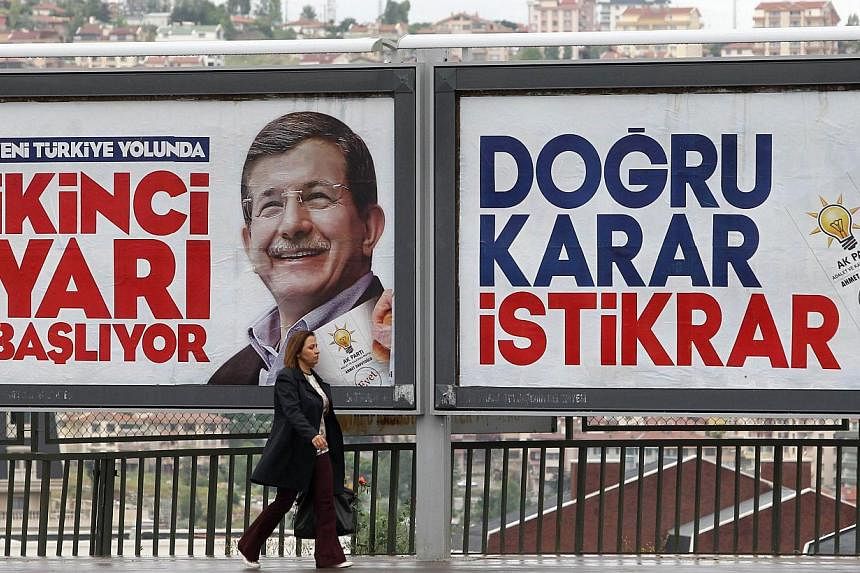KAHTA, Turkey (Reuters) - Seated in front of a huge image of Islam's holiest shrine, Ahmet Turanli, an elder of the Resvan tribe, is just the sort of man whose support Turkey's ruling AK Party might want in a parliamentary election on Sunday.
Tribes like Turanli's, mostly of Kurdish, Turkmen and Arab origin and concentrated in Turkey's southeast, were a powerful force in past elections, in some cases voting in blocs of tens of thousands, often in favour of the Islamist-rooted AKP.
This time, some may rally behind a pro-Kurdish opposition party and potentially cost President Tayyip Erdogan the AKP majority he wants to help guarantee him executive powers.
Sunday's vote could see the AKP's majority shrink for the first time since it entered parliament in 2002, particularly if the pro-Kurdish Peoples' Democratic Party (HDP) can cross the 10 per cent threshold needed to win representation.
Turanli sees an almost existential battle for Kurdish political identity, with the HDP, its roots in Kurdish nationalism, contesting the election as a party for the first time.
"Against these people in power, against these dictators, the HDP must be in parliament," the 65-year-old said, sipping tea in his living room, one of its walls adorned with an image of the Kaaba, the black-clad cube in the Grand Mosque in Mecca.
"They must overcome this threshold obstacle, it is more important than ever."
Kurdish opposition candidates have run as independents in the past. Now, in an all or nothing gamble, the HDP will be left unrepresented if it fails to meet the threshold.
"Many members of my family have voted for AKP in the past, but I know that in this election they won't," Turanli said in the province of Adiyaman, religiously conservative and mostly Kurdish.
His cousin Dengir Mir Mehmet Firat, a former AKP lawmaker who is now a candidate for the HDP, said that while tribal influence over voters had declined in recent decades, extended family ties and loyalties still ran deep.
"To say that the tribal system of the past is intact would be dreaming. But I have been a politician for 42 years. There is nobody in Adiyaman that I don't know, and no place that I haven't been," Firat said. "It is an emotional connection that we are relying on."
Erdogan wants the AKP to win at least two thirds of the seats in parliament, enough to allow the ruling party to change the constitution unopposed and introduce the executive presidential system he has long coveted.
Opinion polls show that as unlikely, particularly with the HDP polling near the 10 per cent mark. Should it enter parliament, it could deprive the AKP of a super-majority and potentially force it into coalition with another party, scuppering Erdogan's plans.
At the last parliamentary election in 2011, independent Kurdish opposition candidates won around 6.5 per cent of the overall vote.
But the HDP has sought to widen its net, casting itself as the party of the left and a champion of equal rights for all, not just Kurds. Its leader, Selahattin Demirtas, took 9.8 per cent of the vote in a presidential bid last August.
Adnan Boynukara, an AKP parliamentary candidate for Adiyaman, said the extent of support for the party, particularly among tribal elders, was exaggerated.
"It's true that the HDP has found a tide in favour of it,"said Boynukara, 50, drinking tea with residents of the small town of Besni while out on the campaign trail. "But I know that some of those people HDP counts on in Adiyaman will not vote for them."
Some religiously conservative Kurds are uneasy with the HDP's leftist agenda. The party is promoting a progressive platform of equal rights for women, protection of the environment and respect for the LGBT community.
Erdogan has courted the Kurds, who account for a fifth of Turkey's population, in recent years, doing more than any previous leader to try to end a three-decade insurgency by Kurdish militants and extending Kurdish rights.
The AKP has typically attracted at least half of the Kurdish vote.
But the conflict in neighbouring Syria, now in its fifth year, has complicated Turkey's relations with its Kurds.
About 130 km south of Adiyaman in the border town of Suruc, sentiment towards the AKP remains sour.
Dozens of people were killed last October in protests in the region triggered by Kurdish anger at Turkey's perceived inaction as Islamic State in Iraq and Syria militants besieged the Kurdish town of Kobani just across the border in Syria.
"People saw the true face of Erdogan when he said Kobani was about to fall (to ISIS)," said Recep Kalkan, 56, who has voted for the AKP in the past three general elections. "Those comments were poisonous for us all."
Ankara refrained from intervening militarily in Kobani, even though the siege took place within sight of Turkish military positions, and has been wary of supporting Kurdish fighters in Syria amid concern about a push for Kurdish autonomy there.
"I voted for Erdogan," said Gulizar Ucar, a housewife in the village of Kara, just outside Suruc, vowing not to support him or the AKP again. "Now he no longer acknowledges us," she said, sitting in the shadow of a black mulberry tree in her garden.

